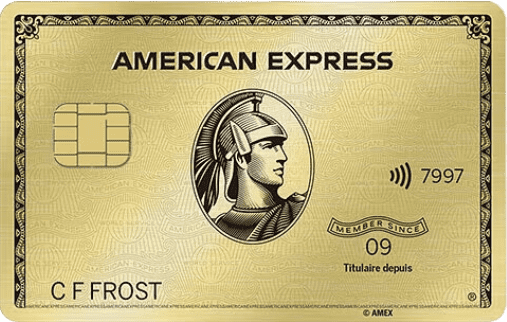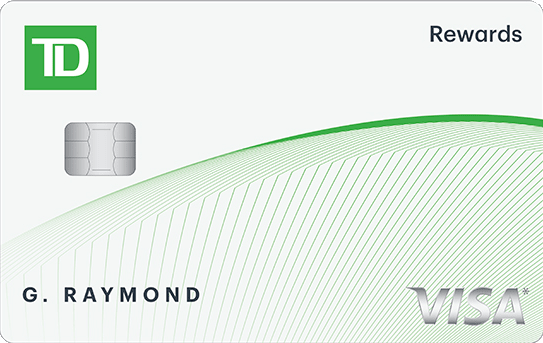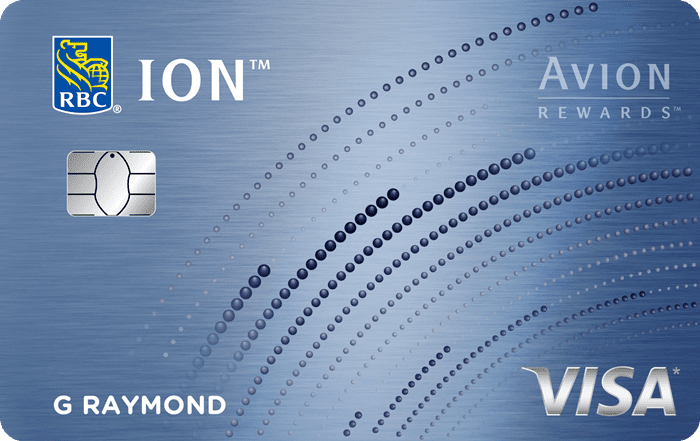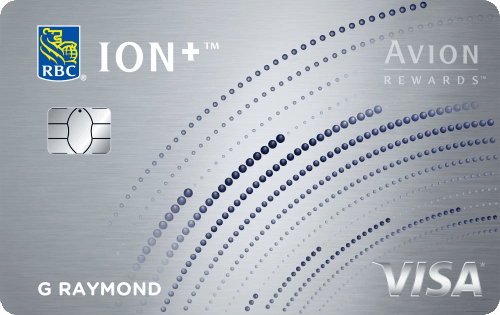Quick overview: RBC ION+ Visa
There are some great travel cards and there are some cards that focus on other benefits. The RBC ION+ Visa Card isn’t quite sure what it wants to be — its relatively meagre signup bonus, recurrent monthly fee and bonus points for daily spending position it squarely alongside a card like the American Express Cobalt (where it is beaten in almost every category).
For those shy of big fees, the RBC ION+ Visa might make sense for its decent rewards rate in popular spending categories and a comparatively modest fee. This card offers3 Avion Ion points† on grocery, dining, food delivery, gas, rideshare, public transit, EV charging, streaming, digital gaming and online subscriptions and 1 Avion Ion point on all other purchases.
This is where reading (or rather, not reading) the fine print is going to burn some Avion point chasers. The RBC ION+ Visa card's reward structure is slightly complex, with Avion points in the ION tier being 50% less valuable than traditional Avion points.
In the terms and conditions, you can redeem Avion points at a rate of 100 points per $1.00 (minimum 1,000 points), whereas 100 ION points are worth $0.58 (and you must redeem a minimum of 2,500 points). This means you’re effectively getting half the bang for your buck, and with the modest (and that’s putting it lightly) welcome bonus, it’s going to take a long while to save for your dream trip on the back of this card.
The $4 per month is low compared to other similar cards, especially for students or those with an RBC banking account, where the fee might be waived. However, unlike other entry-level cards, the first year isn’t free. This may deter some who don’t want to commit to making this card their primary spender over the several years it would take to surpass an annual fee card in value.
Who’s the RBC ION+ Visa for?
Frankly, this card is only for those scared of a high annual fee and students with an RBC account, who pay no fee at all. With no income requirements, the RBC ION+ makes a decent student card for those looking for an entry into the RBC Avion program, or maybe to test out point collecting for the first time. Even without an income requirement, this card still requires you to have a “Good” credit score — above 650.
Pros and cons
Pros
-
Decent rewards rate in everyday spending categories.
-
Low monthly fee, (rebated for students with the RBC AdvantageTM Banking Account for students).
-
Perks like mobile device insurance and fuel savings at Petro-Canada.
Cons
-
Complex rewards structure with less valuable Avion points in the ION tier.
-
Limited insurance benefits (but you can pay to add-on travel insurance).
RBC ION+ Visa welcome bonus
- Get 12,000 Avion points upon approval^—that’s $80 of value in gift cards! Apply by November 4, 2024
How to earn points
- Earn 3 Avion Ion points† per $1 on qualifying grocery, dining, food delivery, gas, rideshare, public transit, EV charging, streaming, digital gaming and online subscriptions
- Earn 1 Avion Ion point per $1 on all other purchases
- You can receive bonus points with regular offers found in RBC’s online banking portal. Many offers come from popular brands like Pet Valu, Indigo.ca and The Keg to name a few.
- Note: Avion points are calculated at 100 points for $1 in savings. With ION cards, you’ll need 172 points for $1 (a point value of $0.58 cents per point). No maximum limit mentioned for earning points.
How to redeem points
You can redeem points for gift cards, merchandise from popular stores like Apple and Best Buy through avionrewards.com. You can also pay your credit card balance or send an Interac e-transfer with points.
Key benefits of the RBC ION+ Visa
- Decent rewards rate in everyday spending categories.
- Low $4 per month, which comes to $48 annually
Insurance coverage
- Mobile device insurance: Up to $1,000 coverage for damage, theft and loss
- Purchase security: Protection against loss, theft, and damage for 90 days
- Extended warranty: Doubles the manufacturer's warranty, up to 1 additional year
Extra benefits
- Earn 50 Be Well points per dollar at Rexall with linked RBC ION+ Card
- Complimentary three-month DashPass subscription from DoorDash
- Save $0.03 per litre on fuel and earn 20% more Petro-Points and Avion Points
How the RBC ION+ Visa Card compares
American Express® Gold Rewards Card

3.9
up to 60k pts
Welcome offerVery Good
Suggested credit scoreEarn up to 60,000 Membership Rewards® points – that’s up to $600 in value.
Pros
-
Generous welcome bonus of up to 60,000 Membership Rewards® points.
-
Convertibility of Member Rewards® points to popular airline and hotel loyalty programs (e.g. Aeroplan, Marriott).
-
Earn two points per dollar on travel, gas, grocery and drugstore purchases.
-
$100 annual travel credit when booking through American Express® Travel online.
-
Built-in travel medical insurance and trip coverage.
Cons
-
$250 annual fee.
-
2.5% foreign transaction fee.
-
Travel medical insurance only covers those under age 65.
Eligibility
Very Good
Recommended Credit Score
Recommended Credit Score
Very Good
2
Earn 2 points for every $1 in Card purchases at eligible gas stations, grocery stores and drugstores in Canada
2
Earn 2 points for every $1 in Card purchases on eligible travel purchases, including flights, hotels, car rentals, and more
1
Earn 1 point for every $1 in Card purchases everywhere else
1
Earn 1 additional Membership Rewards point for every $1 you charge to your Gold Rewards Card on eligible hotel or car rental bookings made with American Express Travel
Earn 2 points for every $1 in Card purchases at eligible gas stations, grocery stores and drugstores in Canada
2
Earn 2 points for every $1 in Card purchases on eligible travel purchases, including flights, hotels, car rentals, and more
2
Earn 1 point for every $1 in Card purchases everywhere else
1
Earn 1 additional Membership Rewards point for every $1 you charge to your Gold Rewards Card on eligible hotel or car rental bookings made with American Express Travel
1
21.99%
Purchase APR Applies to your Flexible Payment Option balance. This charge card has both Due in Full and Flexible Payment Option balances.
21.99%
Cash Advance APR
$250
Annual Fee 1 free additional card
2.5%
Foreign Transaction Fee
Purchase APR
21.99%
Cash Advance APR
21.99%
Annual Fee
$250
Foreign Transaction Fee
2.5%
Pros
-
Generous welcome bonus of up to 60,000 Membership Rewards® points.
-
Convertibility of Member Rewards® points to popular airline and hotel loyalty programs (e.g. Aeroplan, Marriott).
-
Earn two points per dollar on travel, gas, grocery and drugstore purchases.
-
$100 annual travel credit when booking through American Express® Travel online.
-
Built-in travel medical insurance and trip coverage.
Cons
-
$250 annual fee.
-
2.5% foreign transaction fee.
-
Travel medical insurance only covers those under age 65.
Eligibility
Very Good
Recommended Credit Score
Recommended Credit Score
Very Good
2
Earn 2 points for every $1 in Card purchases at eligible gas stations, grocery stores and drugstores in Canada
2
Earn 2 points for every $1 in Card purchases on eligible travel purchases, including flights, hotels, car rentals, and more
1
Earn 1 point for every $1 in Card purchases everywhere else
1
Earn 1 additional Membership Rewards point for every $1 you charge to your Gold Rewards Card on eligible hotel or car rental bookings made with American Express Travel
Earn 2 points for every $1 in Card purchases at eligible gas stations, grocery stores and drugstores in Canada
2
Earn 2 points for every $1 in Card purchases on eligible travel purchases, including flights, hotels, car rentals, and more
2
Earn 1 point for every $1 in Card purchases everywhere else
1
Earn 1 additional Membership Rewards point for every $1 you charge to your Gold Rewards Card on eligible hotel or car rental bookings made with American Express Travel
1
21.99%
Purchase APR Applies to your Flexible Payment Option balance. This charge card has both Due in Full and Flexible Payment Option balances.
21.99%
Cash Advance APR
$250
Annual Fee 1 free additional card
2.5%
Foreign Transaction Fee
Purchase APR
21.99%
Cash Advance APR
21.99%
Annual Fee
$250
Foreign Transaction Fee
2.5%
RBC ION+ Visa Card vs. American Express Gold Card
If you’re familiar with Amex cards, you’re familiar with their higher annual fees. The American Express Gold Card is no exception (with a $250 fee), and if you’re deterred by an upfront expense, there’s no comparing these two cards. But with that cost comes a slew of benefits surpassing anything offered by the RBC ION+ Visa. For instance, the Amex fee is offset by a pretty sweet $100 travel credit, good for hotels, car rentals and other necessary expenses you might incur on a trip.
And while both cards reward your spending on everyday purchases like groceries and gas, the Amex welcome bonus of up to 60,000 Membership Rewards® points* is absolutely going to be more appealing to would-be travellers than the paltry ION+ points offered by the Avion card. And let’s not forget the extended travel insurance on the Amex that is notably missing on RBC’s Ion+ card. Neither card has income requirements. So, despite the high cost of the Amex gold card, there are far more rewards to be had with it. If you’re a traveller, the ability to transfer Amex points 1-1 for Aeroplan or 1.5-1 for Marriott Bonvoy points is going to make your rewards far more flexible.
Contact American Express for the most up-to-date referral bonus figures.
American Express is not responsible for maintaining or monitoring the accuracy of information on this website. For full details and current product information, click the Apply Now link. If you apply and get approved for an American Express Card, (I/we) may receive compensation from American Express, which can be in the form of monetary payment.
TD Rewards Visa* Card

3.2
up to $50
Welcome offerExcellent
Suggested credit scoreEarn a value of $50† in TD Rewards Points† to use on eligible Amazon.ca purchases plus, no Annual Fee. Conditions Apply. Account must be approved by January 6 2025.
Expires
Jan 6, 2025
Pros
-
Wide range of point redemption options, including travel†, Amazon.ca†, online retailers†, card statement credits†, etc.
-
Good rate of return on spending and redeeming via the travel platform Expedia® For TD†
-
Decent value for those that have a high volume of recurring bills
Cons
-
Point redemption values are moderate to poor
-
Low spending limits for earning extra points on groceries and restaurants
-
High credit score requirement
Eligibility
Excellent
Recommended Credit Score
$0
Required Annual Personal Income
$0
Required Annual Household Income
Recommended Credit Score
Excellent
Required Annual Personal Income
$0
Required Annual Household Income
$0
4 Points
Earn 4 TD Rewards Points for every $1 you spend on travel through ExpediaForTD.com†
3 Points
Earn 3 TD Rewards Points for every $1 you spend on groceries and restaurants†
2 Points
Earn 2 TD Rewards Points for every $1 you spend on recurring bills†
1 Points
Earn 1 TD Rewards Point for every $1 you spend on all other purchases†
50%
Earn 50% more TD Rewards Points and 50% more Stars at Starbucks†
Earn 4 TD Rewards Points for every $1 you spend on travel through ExpediaForTD.com†
4 Points
Earn 3 TD Rewards Points for every $1 you spend on groceries and restaurants†
3 Points
Earn 2 TD Rewards Points for every $1 you spend on recurring bills†
2 Points
Earn 1 TD Rewards Point for every $1 you spend on all other purchases†
1 Points
Earn 50% more TD Rewards Points and 50% more Stars at Starbucks†
50%
19.99%
Purchase APR APR for purchases 19.99%†
22.99%
Balance Transfer Rate APR for balance transfers 22.99%†
22.99%
Cash Advance APR APR for cash advances 22.99%†
$0
Annual Fee Additional cardholder is $0
2.5%
Foreign Transaction Fee 2.5% of the transaction in CND
Purchase APR
19.99%
Balance Transfer Rate
22.99%
Cash Advance APR
22.99%
Annual Fee
$0
Foreign Transaction Fee
2.5%
Pros
-
Wide range of point redemption options, including travel†, Amazon.ca†, online retailers†, card statement credits†, etc.
-
Good rate of return on spending and redeeming via the travel platform Expedia® For TD†
-
Decent value for those that have a high volume of recurring bills
Cons
-
Point redemption values are moderate to poor
-
Low spending limits for earning extra points on groceries and restaurants
-
High credit score requirement
Eligibility
Excellent
Recommended Credit Score
$0
Required Annual Personal Income
$0
Required Annual Household Income
Recommended Credit Score
Excellent
Required Annual Personal Income
$0
Required Annual Household Income
$0
4 Points
Earn 4 TD Rewards Points for every $1 you spend on travel through ExpediaForTD.com†
3 Points
Earn 3 TD Rewards Points for every $1 you spend on groceries and restaurants†
2 Points
Earn 2 TD Rewards Points for every $1 you spend on recurring bills†
1 Points
Earn 1 TD Rewards Point for every $1 you spend on all other purchases†
50%
Earn 50% more TD Rewards Points and 50% more Stars at Starbucks†
Earn 4 TD Rewards Points for every $1 you spend on travel through ExpediaForTD.com†
4 Points
Earn 3 TD Rewards Points for every $1 you spend on groceries and restaurants†
3 Points
Earn 2 TD Rewards Points for every $1 you spend on recurring bills†
2 Points
Earn 1 TD Rewards Point for every $1 you spend on all other purchases†
1 Points
Earn 50% more TD Rewards Points and 50% more Stars at Starbucks†
50%
19.99%
Purchase APR APR for purchases 19.99%†
22.99%
Balance Transfer Rate APR for balance transfers 22.99%†
22.99%
Cash Advance APR APR for cash advances 22.99%†
$0
Annual Fee Additional cardholder is $0
2.5%
Foreign Transaction Fee 2.5% of the transaction in CND
Purchase APR
19.99%
Balance Transfer Rate
22.99%
Cash Advance APR
22.99%
Annual Fee
$0
Foreign Transaction Fee
2.5%
RBC ION+ Visa Card vs. TD Rewards Visa Card
The TD Rewards Visa is another starter card that doesn’t offer much in the way of interest to serious point collectors, but might be a decent option for students or folks with fee-phobia.
Unlike the RBC ION+ Visa, you won’t have to pay a dime in annual fees on the TD Rewards Visa. There’s a modest welcome bonus, which in my opinion falls short of the Avion ION points offered by the RBC card.
The real value might be for students looking to open a TD account for the first time – TD currently offers a promotion where students opening a TD chequing account automatically receive a TD Rewards Visa, all without any fee.
This offer is not available for residents of Quebec. For Quebec residents, please click here.
The Toronto-Dominion Bank (TD) is not responsible for the contents of this site including any editorials or reviews that may appear on this site. For complete and current information on any TD product, please click the Apply Now button. Sponsored Content.
†Terms and conditions apply.
RBC ION Visa

2.3
6,000 pts
Welcome offerFair
Suggested credit scoreGet 6,000 Avion points upon approval* - that’s $40 of value in gift cards+! Apply by November 4, 2024.
Pros
-
No annual fee
-
Minimum redemption is only $10
-
DoorDash subscription worth $30
Cons
-
Miserly welcome bonus, valued at less than many cash back bonuses
-
Collects Avion ION points which are worth about half as much as traditional Avion points
-
Pretty “meh” on points collection through daily spending
Eligibility
Fair
Recommended Credit Score
Recommended Credit Score
Fair
1.5x
Avion points for every $1 spent on groceries, transportation (gas, rideshare, transit, EV charging), and streaming services and subscriptions
1
Avion point for every $1 spent on all other qualifying purchases
1
year extension on manufacturer's warranty
90 days
of purchase security protection
3¢/L
savings at Petro-Canada
50
Be Well points at Rexall for every $1 spent
3
month DashPass subscription to enjoy unlimited deliveries with $0 delivery fees from DoorDash.
Avion points for every $1 spent on groceries, transportation (gas, rideshare, transit, EV charging), and streaming services and subscriptions
1.5x
Avion point for every $1 spent on all other qualifying purchases
1
year extension on manufacturer's warranty
1
of purchase security protection
90 days
savings at Petro-Canada
3¢/L
Be Well points at Rexall for every $1 spent
50
month DashPass subscription to enjoy unlimited deliveries with $0 delivery fees from DoorDash.
3
20.99%
Purchase APR
22.99%
Balance Transfer Rate
22.99%
Cash Advance APR
$0
Annual Fee $0 for additional cards
2.5%
Foreign Transaction Fee 2.5% of the transaction in CDN
Purchase APR
20.99%
Balance Transfer Rate
22.99%
Cash Advance APR
22.99%
Annual Fee
$0
Foreign Transaction Fee
2.5%
Pros
-
No annual fee
-
Minimum redemption is only $10
-
DoorDash subscription worth $30
Cons
-
Miserly welcome bonus, valued at less than many cash back bonuses
-
Collects Avion ION points which are worth about half as much as traditional Avion points
-
Pretty “meh” on points collection through daily spending
Eligibility
Fair
Recommended Credit Score
Recommended Credit Score
Fair
1.5x
Avion points for every $1 spent on groceries, transportation (gas, rideshare, transit, EV charging), and streaming services and subscriptions
1
Avion point for every $1 spent on all other qualifying purchases
1
year extension on manufacturer's warranty
90 days
of purchase security protection
3¢/L
savings at Petro-Canada
50
Be Well points at Rexall for every $1 spent
3
month DashPass subscription to enjoy unlimited deliveries with $0 delivery fees from DoorDash.
Avion points for every $1 spent on groceries, transportation (gas, rideshare, transit, EV charging), and streaming services and subscriptions
1.5x
Avion point for every $1 spent on all other qualifying purchases
1
year extension on manufacturer's warranty
1
of purchase security protection
90 days
savings at Petro-Canada
3¢/L
Be Well points at Rexall for every $1 spent
50
month DashPass subscription to enjoy unlimited deliveries with $0 delivery fees from DoorDash.
3
20.99%
Purchase APR
22.99%
Balance Transfer Rate
22.99%
Cash Advance APR
$0
Annual Fee $0 for additional cards
2.5%
Foreign Transaction Fee 2.5% of the transaction in CDN
Purchase APR
20.99%
Balance Transfer Rate
22.99%
Cash Advance APR
22.99%
Annual Fee
$0
Foreign Transaction Fee
2.5%
RBC ION+ Card vs. RBC ION Card
The RBC ION and its + kin are (as you probably guessed) cut from the same cloth. The big difference comes down to the fee and the welcome bonus. Where the ION+ really earns that plus distinction is in its spending categories. For the stock ION, you’ll only be pulling in1.5 Avion points on groceries, transportation (gas, rideshare, transit, EV charging), and streaming services and subscriptions. In the same categories the ION+ offers 3 points per dollar spent. If you’re spending a lot of money in the designated categories, the ION+ is going to offer more down the road, in addition to the substantially larger welcome bonus.
What a Reddit user had to say about the ION+ Visa
“This ION+ is probably the best points card for anyone who can't qualify for the AMEX Cobalt, Scotia Gold AMEX, the MBNA [Rewards World Elite] card or the National Bank World Elite MasterCard or don't care for premium card features and want to save on the annual fee.
- Reddit user @deltatux
Is the RBC ION+ Visa Card worth it?
It’s hard to put it better than @deltatux above. If you can’t qualify for better cards, the RBC ION+ Visa Card is worth considering. Otherwise, there are better cards.
But if you’re working on developing your credit score, or intent on keeping your fees low, the RBC ION+ Visa may be a fit for those looking for a low-fee card with a high rewards rate in everyday spending categories.
In particular, it’s a good option for students or those with an RBC banking account. But for big travellers and point collectors, you might want to explore other options. The card's value increases if you frequently shop at Rexall or fill up at Petro-Canada, leveraging its unique perks.
Refer to RBC page for up to date offer terms and conditions.
This post contains affiliate links. Please read disclaimer for more info.
Disclaimer: Money.ca may engage in affiliate marketing, which is done by embedding tracking links into Money.ca. If you click on a link for an affiliate partnership, a cookie will be placed on your browser to track any sales for purposes of commissions.
FAQs

Cam is a content marketer with a passion for saving, financial independence, and pulling off elaborate credit card point schemes. He has worked in Fintech and Finserve (specifically Group Retirement) and loves researching and writing about finance.
Compare other RBC credit cards
Compare other RBC credit cards
Compare other Visa credit cards
Compare other Visa credit cards
Compare other travel credit cards
Compare other travel credit cards
Disclaimer
The content provided on Money.ca is information to help users become financially literate. It is neither tax nor legal advice, is not intended to be relied upon as a forecast, research or investment advice, and is not a recommendation, offer or solicitation to buy or sell any securities or to adopt any investment strategy. Tax, investment and all other decisions should be made, as appropriate, only with guidance from a qualified professional. We make no representation or warranty of any kind, either express or implied, with respect to the data provided, the timeliness thereof, the results to be obtained by the use thereof or any other matter. Advertisers are not responsible for the content of this site, including any editorials or reviews that may appear on this site. For complete and current information on any advertiser product, please visit their website.






